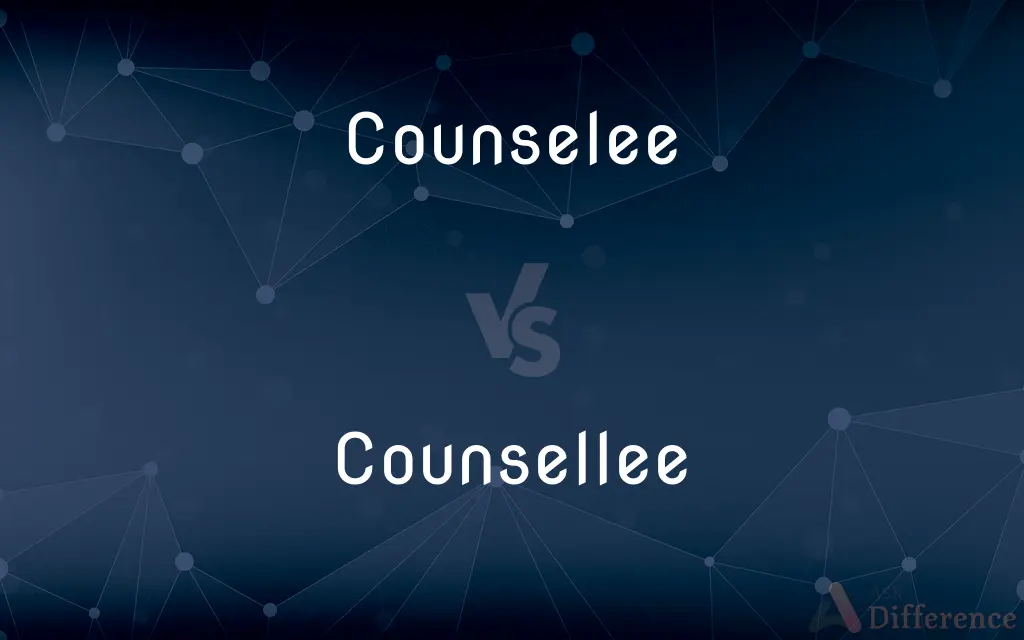Counselee vs. Counsellee — What's the Difference?
By Tayyaba Rehman & Urooj Arif — Updated on April 7, 2024
Both "counselee" and "counsellee" refer to a person receiving guidance or advice, but "counselee" is the more commonly accepted spelling.

Difference Between Counselee and Counsellee
Table of Contents
ADVERTISEMENT
Key Differences
The terms "counselee" and "counsellee" are variants of a noun that designates a person who receives counseling or advice from a counselor. The primary difference between the two lies in their spelling and usage frequency, rather than in meaning. "Counselee" is the more widely recognized and used form, particularly in professional contexts related to psychology, education, and guidance services. On the other hand, "counsellee" is less commonly used and might be considered an alternative or less standard spelling of the same term.
In counseling settings, a counselee (or counsellee) participates in sessions aimed at providing them with support, guidance, or therapy. These sessions can address a wide range of issues, including personal, academic, career, and mental health concerns. The spelling "counselee" aligns with the conventional formation of nouns from verbs ending in "sel" by adding the suffix "ee" (as in employee from employ), which may explain its prevalence.
The distinction between "counselee" and "counsellee" is largely a matter of spelling preference and convention, rather than a difference in function or role. In both cases, the individual is engaged in a counseling relationship, looking to gain insight, resolve problems, or receive support.
Educational materials, professional guidelines, and literature in the field of counseling and psychology are more likely to use "counselee." This consistency in terminology helps maintain clarity and standardization in professional communication. However, it's important for professionals and clients alike to recognize that both spellings refer to the same role within the counseling dynamic.
The choice between "counselee" and "counsellee" may also reflect regional spelling preferences or variations in the practice of counseling across different cultural contexts. Despite these variations, the core purpose and function of the role remain consistent: to engage in a process aimed at promoting personal growth, emotional well-being, and problem-solving capabilities.
ADVERTISEMENT
Comparison Chart
Definition
A person receiving counseling.
A person receiving counseling.
Spelling & Usage
More commonly accepted and used.
Less commonly used, alternative spelling.
Contexts
Professional, educational, psychological.
Same as counselee, but less preferred.
Recognition
Widely recognized in counseling literature.
Less standard, might be seen as variant.
Purpose
Engage in counseling for support or advice.
Same purpose as counselee.
Compare with Definitions
Counselee
An individual receiving counseling.
The counselee discussed their career goals during the session.
Counsellee
Same as counselee.
The counsellee gained insights into their behavioral patterns.
Counselee
Receives support for personal issues.
The counselee learned coping strategies for anxiety.
Counsellee
Participates in goal-oriented sessions.
The counsellee set realistic objectives with their counselor.
Counselee
Engages with a counselor for advice or therapy.
A counselee might seek help for stress management.
Counsellee
Engages in similar therapeutic processes.
Counsellees benefit from a non-judgmental environment.
Counselee
Participates in counseling sessions.
Counselees often report improved well-being after therapy.
Counsellee
Receives identical support and guidance.
Each counsellee's confidentiality is paramount.
Counselee
Seeks guidance in decision-making.
As a counselee, she explored various academic pathways.
Counsellee
Works on personal growth and solutions.
The counsellee developed better communication skills.
Counselee
A person receiving counselling.
Counsellee
One who receives counselling
Common Curiosities
Are counselee and counsellee interchangeable?
Yes, the terms are interchangeable, referring to someone who receives counseling, though "counselee" is more commonly used.
How should I decide which spelling to use?
It's best to use "counselee" to align with the more commonly accepted terminology in professional and educational settings.
Why is "counselee" more widely accepted than "counsellee"?
"Counselee" follows a more standard pattern of noun formation in English and is more commonly recognized in professional contexts.
Do counselees have a specific role in the counseling process?
Yes, counselees are active participants who engage with counselors to seek advice, support, or therapy for various issues.
Is one spelling more correct than the other?
While "counselee" is more standard, correctness can vary by regional preferences; however, "counselee" is generally more accepted.
Is confidentiality important for a counselee?
Absolutely, maintaining confidentiality is a cornerstone of the counseling relationship, ensuring a safe space for counselees.
Can either spelling be used in formal writing?
While both can be understood, "counselee" is preferred in formal and professional writing due to its widespread acceptance.
Does the spelling difference affect the counseling process?
No, the spelling difference does not impact the nature or quality of the counseling provided.
Can someone be a counselee for different types of counseling?
Yes, individuals can be counselees in various contexts, including personal, career, academic, or mental health counseling.
How can one become a counselee?
Individuals can become counselees by seeking out counseling services from licensed professionals or counseling centers.
Share Your Discovery

Previous Comparison
Sensible vs. Mature
Next Comparison
Corrosion vs. RancidityAuthor Spotlight
Written by
Tayyaba RehmanTayyaba Rehman is a distinguished writer, currently serving as a primary contributor to askdifference.com. As a researcher in semantics and etymology, Tayyaba's passion for the complexity of languages and their distinctions has found a perfect home on the platform. Tayyaba delves into the intricacies of language, distinguishing between commonly confused words and phrases, thereby providing clarity for readers worldwide.
Co-written by
Urooj ArifUrooj is a skilled content writer at Ask Difference, known for her exceptional ability to simplify complex topics into engaging and informative content. With a passion for research and a flair for clear, concise writing, she consistently delivers articles that resonate with our diverse audience.














































